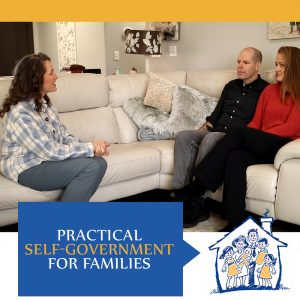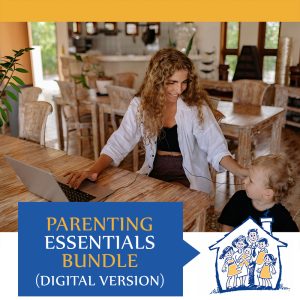Surviving Mom’s Worst Day Ever!
When the famed prime minister of England, William Pitt, was asked what made him a great prime minister, he didn’t say his hard work ethic, late night hours, or perseverance. He said, “Patience.”
There are many attributes that are useful to parents as they’re raising their children during this often busy world full of attitude problems, disconnection, and every day mishaps. But nothing is so vital as patience. There is one simple skill that, if kept in mind, makes patience for parents a bit easier.
Recently, while speaking to a group in Washington, a worn out mother asked me a question following some discussion on how to stay clam while parenting through difficult parenting situations. She said something like, “What do you do when too much has happened in a day to be able to stay calm? What do you do when you’ve fallen down some stairs that day, another child has had a severe injury, and one of your other children is trying to dominate you with his aggressive and controlling attitude?”
I could see the pain in this sweet mother’s face. Her leg was raised on a chair, obviously still hurting from her fall. She had had, just the day before coming to my one-day parenting event, possibly her worst day ever. And, amidst all that emotional and physical confusion, she wanted to know what she could have done differently on that day to have felt more calm .
I found myself thinking, “What is the worst day I can think of?” Now, add to that falling down the stairs and getting hurt while trying to deal with this day. My heart went out to her. But I knew that even in a time like this patience was possible — if I saw the situation through the correct empowering lens and if I had learned a particular skill beforehand.
The Empowering, Healing Lens for Life
There was an overwhelming moment during my life when I had two teenage foster children that often threw tantrums. I also had two toddlers that did the same. After a few days of thinking how hard and bad my life was, I wasn’t happy because I felt I wasn’t doing a great job at parenting. I can honestly say I was thinking more about myself than anything else.
Even though I must take good care of my health, I also know that focusing on what I feel all the time only leads me to be negative. So, thinking about my feelings while in a situation doesn’t help me cope with the situation. In fact, it does just the opposite; it discourages me.
To become and stay empowered it’s best to think less about ourselves and more about connecting to the people around us. Even introverts, who refuel with solitude, become more empowered when they feel a mutual connection with their children and spouse. This connection, which can happen by simply slowing down enough to engage in a heartfelt conversation, read a story, play a game, or just look someone in the eyes with love in our hearts, gives life more meaning and increases the presence of love.
Connection motivates us to see the people around us as more than a task list or challenge in life. They create the greatest, most rewarding, moments of our days. This mindset empowers us to focus on creating connection instead of disconnecting or creating emotional isolation.
Another vital part of the empowering, healing lens for life is looking for the good in people and situations. Looking for the good in people is called gratitude; and looking for the good in situations is called optimism.
Optimistic people purposely decide to look only for the good things in life. They allow the negative parts of the day to roll off them emotionally. My husband always tells himself and our children during hard times to not let difficulties get you down, but to treat them like “water off a duck’s back.”
Looking for the good in people, even ourselves during our worst moments, can be harder for some people than others. Some people struggle with perfectionism. Others have a tendency to judge people, even when they love the person. Making the small errors and imperfections of others a big deal in our minds is judging.
Everyone makes mistakes, and there are more than ways than one to solve a problem or complete a task. So, what if someone parks in a different parking spot than you think would be best, or loads the dishwasher a different way? Instead, focus on the person’s kindness in driving you and helping you do the dishes, instead of what you would have done. Be grateful for them in all the moments of your life.
A Skill Set for Patience
Optimism and gratitude can be difficult, but patience is oftentimes the hardest skill for a person to apply in their lives. Having patience requires valuing others by not judging, and optimistically having gratitude for life’s educational journey. There is a skill, for children and adults, called “accepting ‘no’ answers” that can remind us how to have patience when it seems so hard.
There are many things in life that are “No” answers besides just being told no by someone. For example, when something doesn’t go our way, dealing with a health problem, or encountering difficult situation — just to name a few.
To accept a “No” answer a person does these four things.
• Look at the person
• Keep a calm face, voice, and body
• Say, “Okay” or ask to disagree appropriately
• Drop the subject
When parents are in the middle of a hard moment, or maybe even experiencing their worst day ever, they need to connect to the people by looking at them, staying calm, be telling themselves that it’s okay to be the parent. Continue teaching in this situation. Be okay that this situation happened. And finally, parents need to drop the subject. Dropping the subject means stop thinking or talking about the situation.
Happy people teach themselves not to dwell on the negative moments of life. If a child made a bad choice, or if I fell down the stairs, dwelling on the situation only makes me feel small and powerless — if not also negative and depressed.
Look for the good. Drop the subject. Once something happens, calmly handle it and move on. Don’t think about the bad. Don’t tell people about the bad moments either. Be happy. It’s a choice.
Patience is powerful; maybe one of the most powerful attributes a person can have. Thankfully it is something we can develop by changing our outlook and improving our skills.
Click here to learn about other skills that help families think and communicate more happily.
Index
- Accepting No Answers and Criticism, Analyzing, Calm, Changing Hearts, Common Vision Creation, Connecting (Looking in the eyes), Correcting, Couple Relationship, Culture, Describe, Disagreeing Appropriately, Dropping the subject, Encouragement, Family Culture, Family Standard, Family Unity, Four Basic Skills, Marriage Relationship, Mutual Respect, Power of Calm, Praise, Pre-Teach, Problem Solving, Relationships, Respect, Rule of Three (ages 6-8+), Seek to Understand, Skills, Social Skills, Structure, Tone






